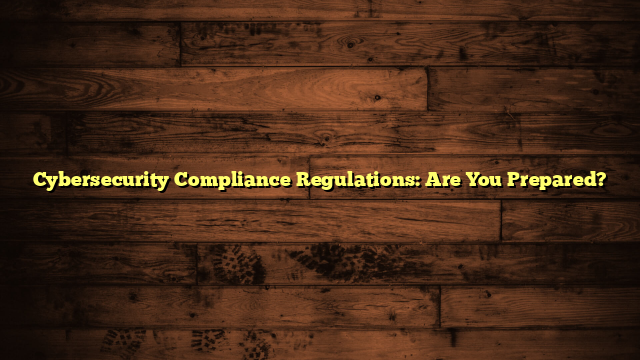Cybersecurity Compliance Regulations
In an period the place digital threats loom giant and information breaches make headlines, understanding cybersecurity compliance rules is extra essential than ever. These rules are designed to safeguard delicate information in opposition to cyber threats whereas making certain organizations function inside authorized boundaries. However with the panorama of cybersecurity consistently evolving, companies should not solely perceive these rules but in addition put together for them. Are you ready to satisfy compliance requirements and defend your group from potential threats? This text will delve deep into the world of cybersecurity compliance rules, outlining what they entail, their significance, and how one can successfully navigate them.
What Are Cybersecurity Compliance Rules?
Cybersecurity compliance rules are a set of legal guidelines, requirements, and pointers that guarantee organizations handle and defend their information securely. They’re important for any enterprise that handles delicate data, equivalent to private identification particulars, monetary information, and different essential information. These rules fluctuate by trade, location, and sort of information processed. Notable examples embody:
- Basic Information Safety Regulation (GDPR): A complete information privateness regulation within the European Union that mandates strict information safety requirements.
- Well being Insurance coverage Portability and Accountability Act (HIPAA): U.S. federal legislation that governs the privateness and safety of healthcare data.
- Fee Card Business Information Safety Normal (PCI DSS): A set of necessities to make sure that all firms that settle for, course of, retailer, or transmit bank card data preserve a safe setting.
By adhering to cybersecurity compliance rules, companies can:
- Improve Safety Posture: By implementing required safety measures, organizations can considerably cut back vulnerabilities.
- Construct Buyer Belief: Compliance indicators to clients that their information is dealt with securely and ethically, fostering belief.
- Keep away from Penalties: Non-compliance can lead to substantial fines, authorized repercussions, and reputational injury.
Why Are Cybersecurity Compliance Rules Vital?
Cybersecurity compliance rules are important for a number of causes, and understanding their significance can enormously affect how your group approaches information safety.
1. Elevated Cyber Menace Panorama
Cyber threats are more and more subtle and pervasive. Corporations face dangers from malware, ransomware, phishing assaults, and insider threats. Cybersecurity compliance rules present a framework for organizations to fortify their defenses in opposition to these threats.
2. Authorized Legal responsibility and Penalties
Failing to adjust to established rules can result in extreme monetary penalties. For instance, underneath GDPR, organizations might be fined as much as 4% of their annual international turnover or €20 million (whichever is bigger) for non-compliance. Thus, understanding and adhering to compliance rules is important not only for safety however for authorized and monetary causes.
3. Enhanced Fame and Buyer Belief
In an age the place information breaches are frequent, clients are more and more involved about how their private information is dealt with. By demonstrating compliance with cybersecurity rules, organizations can improve their fame and construct stronger relationships with clients, offering peace of thoughts that their data is being handled with care.
Key Cybersecurity Compliance Rules You Must Know
Whereas there are quite a few cybersecurity compliance rules globally, understanding probably the most impactful ones can assist companies prioritize their efforts:
1. Basic Information Safety Regulation (GDPR)
The GDPR got here into impact in Could 2018 and has set new requirements for information privateness. It mandates that organizations acquire private information in a lawful, clear, and honest method. Non-compliance can lead to hefty fines.
2. Well being Insurance coverage Portability and Accountability Act (HIPAA)
For organizations within the healthcare sector, HIPAA establishes regulatory requirements to safe delicate affected person data. Compliance includes implementing particular safety measures to guard digital well being information (EHRs).
3. Fee Card Business Information Safety Normal (PCI DSS)
Companies that course of bank card funds should adjust to PCI DSS, which contains a complete set of safety necessities designed to make sure the security of bank card information.
4. Federal Data Safety Administration Act (FISMA)
FISMA applies to federal companies in addition to contractors. It establishes a framework to guard authorities data and mandates common assessments of safety controls.
Steps to Guarantee Cybersecurity Compliance
Turning into compliant with cybersecurity rules requires a structured strategy. Listed here are actionable steps organizations can take:
1. Conduct a Compliance Audit
Start with a complete audit of your present cybersecurity insurance policies, practices, and instruments. Assess how they align with related rules. Establish gaps and areas needing enchancment.
2. Develop a Cybersecurity Coverage
Create a sturdy cybersecurity coverage that addresses the particular necessities of the rules relevant to your group. Guarantee this coverage is well-documented and disseminated amongst all staff.
3. Implement Required Safety Controls
Based mostly in your audit findings and the rules that apply, implement obligatory safety controls. This will likely embody firewalls, information encryption, entry controls, and common software program updates.
4. Practice Your Staff
Hman error is usually cited as a number one reason for safety breaches. Conduct common coaching classes to coach staff on information safety practices, phishing consciousness, and compliance necessities.
5. Usually Monitor and Audit
Compliance is not a one-time effort; it requires ongoing vigilance. Usually monitor safety programs, conduct audits, and evaluation compliance processes to make sure they continue to be efficient and up-to-date.
6. Keep Knowledgeable
Cybersecurity rules are sometimes revised to handle rising threats. Keep knowledgeable about modifications within the regulatory panorama, and adapt your practices accordingly.
Conclusion: Are You Ready for Cybersecurity Compliance Rules?
Navigating the intricate world of cybersecurity compliance rules might be difficult. Nonetheless, the advantages far outweigh the hassle concerned. Not solely can compliance defend your group from extreme penalties and reputational injury, however it will probably additionally fortify your defenses in opposition to an ever-evolving cyber risk panorama.
By taking proactive steps—conducting audits, growing complete insurance policies, coaching your staff, and staying knowledgeable—you’ll be able to set up a powerful compliance posture. The query stays: are you ready? Begin at present by evaluating your cybersecurity practices and aligning them with relevant rules. With the best strategy, you’ll be able to guarantee your group not solely survives however thrives within the digital age.











